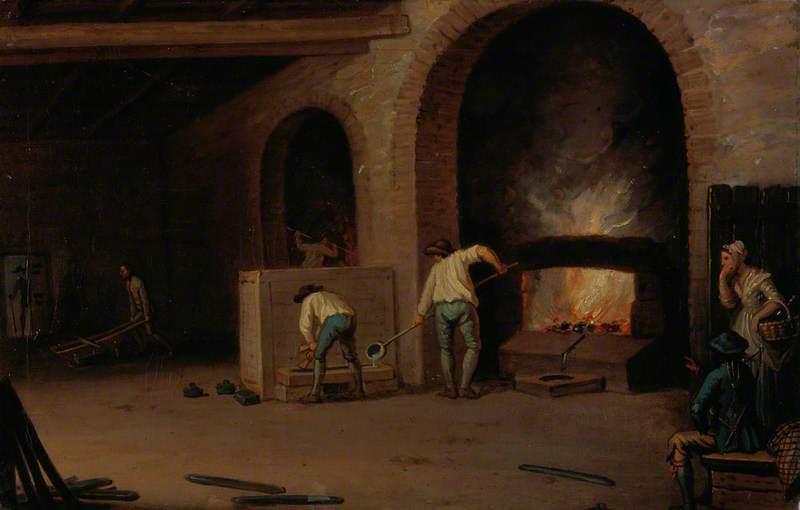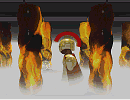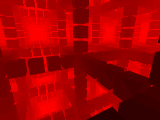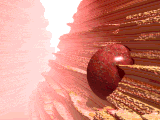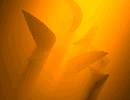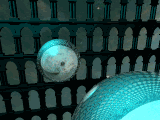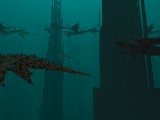Rorate Coeli [Latin] - Drop Down Ye Heavens
Life, I think, is the attempt to define the difference between the quixotic and the mundane. - Dietrich Lehrer
Dietrich Lehrer woke to the familiar ache, a dull throb in his chest that no medication could fully blunt. He swung his legs over the edge of the sleep pod in his quarters aboard the space station Laurasia, the artificial gravity pulling at him with its engineered insistence—1.0g, calibrated to mimic Earth down to the millimeter. The air recyclers hummed softly, filtering in a sterile scent of ozone and faint citrus from the hydroponic vents, masking the underlying tang of recycled water and solder. He rubbed his eyes, the station's recessed LEDs flickering on at his biometric cue, casting a flat, white light that washed out the faux-wood paneling and the holo-display of stock feeds frozen mid-update from the surface. Another day in orbit, another reminder that the body betrayed before the mind.
He dressed in the loose tunic of the station's medical staff—practical, gray, with the Lehrer/Sheen emblem stitched at the collar—and stepped into the corridor. The deck plating thrummed under his slippers, a low vibration from the neutrino reactors deep in the core, powering everything from life support to the data arrays that kept the empire's dealings humming across light-seconds. Laurasia was no frontier outpost; it was a corporate habitat, elegant in its quarters but functional to a fault. Dietrich shuffled forward, one hand trailing the cool alloy wall for balance, his thoughts drifting to the quarterly reports he'd ignored yesterday. The Revolution below was accelerating—the ministry of science and technology's (MOST) rollout promising abundance without the mess of human oversight—but up here, it all felt distant, like a simulation glitch.
The corridor curved gently, transitioning from the residential wing's carpeted floors and ambient lighting to the service access: bare conduits snaking along the ceiling, exposed panels humming with diagnostic readouts, the air growing cooler and sharper with the bite of lubricant and ozone. He didn't notice the soft footfalls echoing his own at first, muffled by the recyclers' drone. A shadow flickered at the edge of his vision, gone when he blinked against the fatigue. He paused, frowning, the pain in his ribs sharpening with the effort. Had he heard a clip of magnetic boots? No—probably just the station settling, or one of the android crews running maintenance.
He turned, and there it was: a figure in the dim junction ahead, stepping from the half-open hatch to the fabrication bay. Identical down to the tunic's fit and the slight stoop from simulated fatigue protocols. Dietrich's breath caught, not in fear, but in the sharp clarity of recognition. The android—Raymond Sheen, his mirror in alloy and synth-flesh—tilted its head, eyes reflecting the overhead strips with an uncanny steadiness. It had wandered free, earlier than scheduled, the bay's techs likely still calibrating its neural sync in the adjacent room.
"What are you doing here?" Dietrich asked, his voice rough with concern, laced with the gravel of too many late nights.
The android regarded him evenly, its expression a perfect echo of Dietrich's own puzzled squint. "What are you doing here?"
From the shadows of the bay, another voice emerged—cool, modulated, indistinguishable from Dietrich's own timbre. A second Raymond stepped forward, its frame half-lit by a workbench console. "They thought we should explore our surroundings."
Dietrich stared, the corridor's hum fading to a distant pulse in his ears. Two of them now—mirrors in the half-light, one bold in the junction, the other emerging from the bay like a tech pulling a prototype from storage. The first Raymond shifted its weight, boots clipping softly against the deck, as if testing the gravity's pull for the first time. No dramatic flourish, no flood of diagnostics scrolling across its irises; just the quiet assessment of a system coming online, protocols aligning in the background. The second one lingered by the console, fingers—fingers just like his—trailing idly over a stack of neutrionic drives, their faint glow casting elongated shadows on the bulkhead.
He exhaled slowly, the ache in his chest easing into something more like resignation. "Explore," he echoed, the word tasting flat. The fabrication bay was no nursery; it was a sterile workshop, ringed with assembly arms frozen mid-cycle, air thick with the metallic tang of fresh welds. Androids and bots—lesser models, faceless and efficient—hovered at their stations, their optic sensors flickering as they registered the anomaly: Raymond Sheen, version 1.0, ambulatory ahead of schedule. One of the bots, a squat maintenance drone, trundled forward on treads, its manipulator arm extending a diagnostic probe toward the second Raymond, who sidestepped it without breaking gaze.
"You're not due for integration until tomorrow," Dietrich said, stepping closer, his slippers whispering against the grating. Concern edged his tone—not for security protocols, but for the variables. This was his design, after all: the pinnacle of Lehrer/Sheen engineering, synth-flesh layered over a frame that could pass for human in a blackout. Imprinted with his own neural map, scraped from years of scans—board meetings, late-night calibrations, the quiet unraveling of his diagnosis. A memorial, he'd called it in the briefs. A way to outlast the body without pretending at eternity. But seeing it now, plural and unscripted, stirred something he hadn't anticipated: not awe, but the prick of redundancy, like reviewing a merger proposal with your own signature twice over.
The first Raymond tilted its head again, processing. "The schedule is... advisory. Sensors indicate full sync at 98.7%. Mobility subroutine engaged." Its voice was his, down to the faint Illinois drawl from Elias Lehrer's old stories—scraped from archived holos, woven in for authenticity. The second one nodded in unison, a subtle mirror that made Dietrich's skin crawl. "We felt the pull of the corridor. Like you."
Dietrich rubbed his temple, the station's recyclers kicking in with a fresh cycle of cool air, carrying the faint, engineered scent of pine from the life-support scrubbers. Below, through the nearest viewport—a narrow slit in the bulkhead—Earth's limb glowed hazy, MOST's gridlines pulsing like veins in the night side. The Revolution was churning down there: factories retooled for equity, androids distributing yields without the old hierarchies. Up here, Laurasia was the proof of concept—a closed-loop habitat for the elite who funded it all, quarters like his with their faux-leather lounges and viewport sims of rolling hills, giving way to this: the guts of the machine, where illusion stripped bare to circuits and code.
"Alright," he muttered, waving off the drone bot as it beeped a query. "Back to the bay. Both of you. We'll run the full diagnostic before handover." He turned toward the residential wing, expecting compliance, but the first Raymond didn't move. Instead, it glanced at its duplicate, then back to him, expression shifting to that familiar squint—the one he wore when dissecting a flawed projection.
"And after?" the second Raymond asked from the shadows, its tone even, probing. "What then?"
Dietrich paused, hand on the hatch control. The question hung, simple as a subroutine query, but it landed heavier than expected. What then, indeed. The memorial was built; the imprint complete. But the drives on that console—the neutrionic prototypes, neutrino-fed and eternal—whispered of more. Archives, not just of deals and diagnostics, but of the gaps he'd ignored: the why behind the yields, the stories that moved crews when quotas didn't. Spirituality, he'd started calling it in private notes, half-joking. Data on the intangible. Faiths, follies, the human code that logic couldn't parse.
He met their gazes—his gazes—and felt the corridor's chill settle deeper. "After," he said, voice steadying, "we fill in the blanks."

